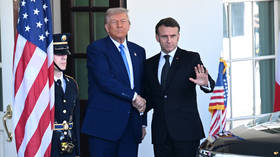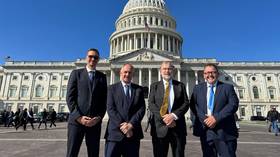Pay people to take Covid-19 vaccine argues leading ethicist, though others warn it would set ‘dangerous precedent’
A leading ethicist has proposed financial and other incentives to increase coronavirus vaccination rates, though many of his contemporaries fear this would set a dangerous precedent with potentially disastrous consequences.
This week, Oxford University Professor Julian Savulescu proposed the idea that a financial incentive could persuade those hesitant to take a Covid-19 vaccine. He also suggested exemption from the wearing of face masks and social distancing as possible alternatives to payment.
Savulescu argues that voluntary vaccination wouldn't guarantee a high enough percentage of the population would get the jab, frustrating virus eradication efforts across the globe.
Indeed, by many estimates, some 80 percent of the general population would need to be vaccinated to achieve herd immunity within a given country, let alone geographic region.
Herd immunity is achieved when the majority of the population are resistant to catching a pathogen, either through past exposure or vaccination.
Savulescu adds that low-risk groups might not bother, with trust in vaccines among certain demographics already low.
Also on rt.com As global anti-vax movements gain ground, growing number of Russians worry about taking any form of coronavirus vaccineHe argues that low risk groups, “should be paid for the risk they are taking for the sake of providing a public good.”
“As long as we are accurate in conveying the limitations in our confidence about the risks and benefits of a vaccine, then it is up to individuals to judge whether they are worth payment,” he says.
Savulescu also provided a cost-benefit analysis to financially incentivising future vaccines, arguing that the cost of the UK's furlough scheme is currently estimated to reach at least £60 billion ($79 billion), with economic shutdown likely costing billions more, in addition to the lives lost.
From an economic perspective, the cost of paying people to vaccinate would offset at least some of the potential losses through widespread pandemic-induced unemployment.
Further, enforcement of vaccines could prove extremely unpopular, seen as infringing on personal freedoms, whereas incentivised vaccines would likely yield more success, Savulescu argues.
The likelihood of total immunity remains uncertain, as the SARS-Cov-2's unique blend of abilities and mutations make it particularly hard to defeat on a global scale. Some 1.22 million people have died worldwide so far in the pandemic, according to official statistics.
Also on rt.com No jab, no movement? UK MP pushes mandatory Covid-19 vaccination for travel, suggests army should oversee rolloutHowever, many health experts have cautioned that the initial wave of vaccines likely won't spell the end of the virus and allow society to return to normal.
The UK's vaccine head Kate Bingham warned that initial vaccines may only help alleviate some of the worst symptoms of Covid-19 but may not prevent infection altogether.
Meanwhile, Helen Bedford, a professor of Child Public Health at UCL, and her colleague Dr. David Elliman said the suggestion of financial incentive for vaccination was dangerous, given that the efficacy of initial vaccines would be largely unknown and spending that much taxpayer money on an unknown could prove unwise in the long term.
Keith Neal, emeritus professor of the epidemiology of infectious diseases at the University of Nottingham, agreed, saying such an incentive would “set a dangerous precedent,” especially in an age of vaccine hesitancy fuelled by “social media falsehoods.”
Think your friends would be interested? Share this story!















